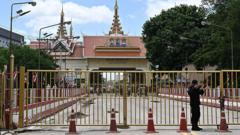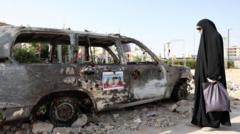Following a series of intense military exchanges, Iran has announced a cease-fire with Israel, presenting the agreement as a demonstration of its strength after the conflict resulted in heavy casualties on both sides. Iranian officials emphasize their capability to retaliate effectively while avoiding a larger war, framing the outcome as a win for Tehran.
Iran Claims Victory as Cease-Fire with Israel Is Announced

Iran Claims Victory as Cease-Fire with Israel Is Announced
Iran declares a cease-fire with Israel, portraying it as a military triumph despite significant losses.
In a surprising turn of events, Iran proclaimed victory on June 24, 2025, as officials announced a cease-fire with Israel, asserting that their military actions had compelled Israel to accept the truce. Iranian state media showcased the announcement with headlines celebrating the "defeat of the Zionist enemy," citing a statement from the national security council which boldly proclaimed that Iran was "imposing a cease-fire" on Israel following recent attacks, including a strike on a U.S. airbase in Qatar.
The conflict began with a 12-day barrage of Israeli airstrikes that decimated much of Iran's military leadership, obliterated some of its air defenses, and targeted key nuclear and missile facilities. These assaults resulted in significant Iranian casualties, including the deaths of numerous civilians. Concurrently, the United States conducted strikes on Iranian nuclear sites, causing further damage to Iran’s nuclear ambitions.
Despite the grim toll, Iranian officials articulated a narrative of triumph, suggesting that their responses, which included missile attacks on Israeli territory—resulting in civilian fatalities—demonstrated resilience and efficacy. Former IRGC commander Gen. Hossein Alaei touted that Iran not only withstood Israeli assaults but was also able to successfully retaliate enough to influence U.S. involvement in the conflict.
While state narratives exuded confidence, insiders noted that the cease-fire was also a strategic maneuver to avoid a potentially unwinnable full-scale war with the United States. The unfolding dynamics illustrate the complexities of regional power struggles, reflecting a blend of military operation, public diplomacy, and strategic calculation.























